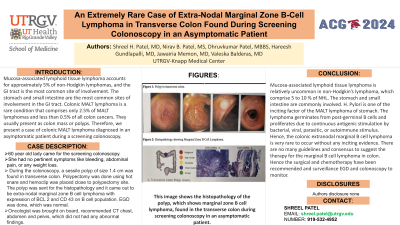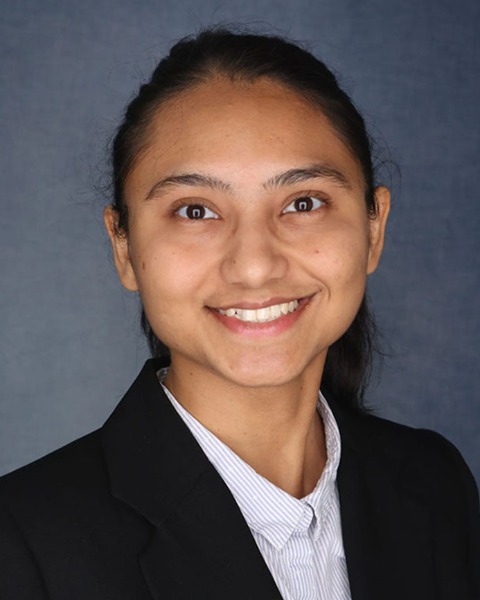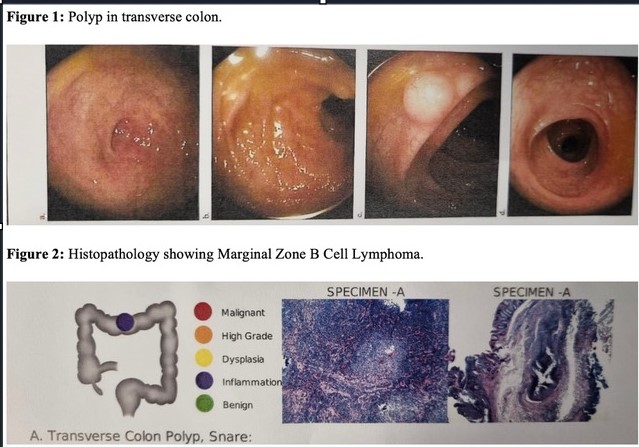Monday Poster Session
Category: Colon
P1962 - An Extremely Rare Case of Extra-Nodal Marginal Zone B-Cell Lymphoma in Transverse Colon Found During Screening Colonoscopy in an Asymptomatic Patient
Monday, October 28, 2024
10:30 AM - 4:00 PM ET
Location: Exhibit Hall E

Has Audio

Shreel H. Patel, MD
University of Texas Rio Grande Valley - Knapp Medical Center
Weslaco, TX
Presenting Author(s)
Shreel H. Patel, MD1, Nirav B. Patel, MS2, Dhruvkumar Patel, MBBS3, Hareesh Gundlapalli, MD4, Jawairia Memon, MD5, Valeska Balderas, MD6
1University of Texas Rio Grande Valley - Knapp Medical Center, Weslaco, TX; 2GCS Medical College, Hospital and Research Centre, Weslaco, TX; 3LSU Health Science Center, Shreveport, LA; 4University of New Mexico, San Antonio, TX; 5UTHSCSA, San Antonio, TX; 6Texas Gastroenterology Institute, McAllen, TX
Introduction: Mucosa-associated lymphoid tissue lymphoma accounts for approximately 5% of non-Hodgkin lymphomas, and the gastrointestinal tract is the most common site of involvement. The stomach and small intestine are the most common sites of involvement in the GI tract. Colonic MALT lymphoma is a rare condition that comprises only 2.5% of MALT lymphomas and less than 0.5% of all colon cancers. They usually present as colon mass or polyps. Therefore, we present a case of colonic MALT lymphoma diagnosed in an asymptomatic patient during screening colonoscopy.
Case Description/Methods: A 60-year-old lady with history of hypertension and diabetes mellitus visited gastroenterologist for the routine screening colonoscopy. Routine history was taken, she denied any abdominal pain, nausea, vomiting, recent unintentional weight loss, melena, hematochezia, hematemesis, dysphagia, near syncope or any family history of malignancy. She did not smoke, drink alcohol or use any recreational drugs. Physical examination was unremarkable. During the colonoscopy, a sessile polyp of size 1.4 cm was found in transverse colon. Polypectomy was done using hot snare and hemoclip was placed close to polypectomy site. The polyp was sent for the histopathology and it came out to be extra-nodal marginal zone B cell lymphoma with expression of BCL 2 and CD 43 on B cell population. EGD was done, which was normal.The patient was referred to the oncologist, who recommended CT scan of the chest, abdomen and pelvis. No abnormal lesions were found on CT scan or any lymph node enlargement. As CT scan was normal, patient did not wanted aggressive treatments. Therefore, the patient was recommended for the surveillance colonoscopy and EGD every year, and routine follow ups with gastroenterologist and oncologist.
Discussion: Mucosa-associated lymphoid tissue lymphoma is relatively uncommon of Non Hodgkin's lymphoma which comprise 5 to 10 % of NHL. The stomach and small intestine are commonly involved. H. Pylori is one of the inciting factor of the MALT lymphoma of stomach. The lymphoma germinate from post germinal B cells and proliferate due to continuous antigenic stimulation by bacterial, viral, parasitic or autoimmune stimulus. Hence the colonic extranodal marginal B cell lymphoma are very rare to occur without any inciting evidence. There are no many guidelines and consensus to suggest the therapy for the marginal B cell lymphoma in colon. Hence the surgical and chemotherapy have been recommended and surveillance EGD and colonoscopy to monitor.

Disclosures:
Shreel H. Patel, MD1, Nirav B. Patel, MS2, Dhruvkumar Patel, MBBS3, Hareesh Gundlapalli, MD4, Jawairia Memon, MD5, Valeska Balderas, MD6. P1962 - An Extremely Rare Case of Extra-Nodal Marginal Zone B-Cell Lymphoma in Transverse Colon Found During Screening Colonoscopy in an Asymptomatic Patient, ACG 2024 Annual Scientific Meeting Abstracts. Philadelphia, PA: American College of Gastroenterology.
1University of Texas Rio Grande Valley - Knapp Medical Center, Weslaco, TX; 2GCS Medical College, Hospital and Research Centre, Weslaco, TX; 3LSU Health Science Center, Shreveport, LA; 4University of New Mexico, San Antonio, TX; 5UTHSCSA, San Antonio, TX; 6Texas Gastroenterology Institute, McAllen, TX
Introduction: Mucosa-associated lymphoid tissue lymphoma accounts for approximately 5% of non-Hodgkin lymphomas, and the gastrointestinal tract is the most common site of involvement. The stomach and small intestine are the most common sites of involvement in the GI tract. Colonic MALT lymphoma is a rare condition that comprises only 2.5% of MALT lymphomas and less than 0.5% of all colon cancers. They usually present as colon mass or polyps. Therefore, we present a case of colonic MALT lymphoma diagnosed in an asymptomatic patient during screening colonoscopy.
Case Description/Methods: A 60-year-old lady with history of hypertension and diabetes mellitus visited gastroenterologist for the routine screening colonoscopy. Routine history was taken, she denied any abdominal pain, nausea, vomiting, recent unintentional weight loss, melena, hematochezia, hematemesis, dysphagia, near syncope or any family history of malignancy. She did not smoke, drink alcohol or use any recreational drugs. Physical examination was unremarkable. During the colonoscopy, a sessile polyp of size 1.4 cm was found in transverse colon. Polypectomy was done using hot snare and hemoclip was placed close to polypectomy site. The polyp was sent for the histopathology and it came out to be extra-nodal marginal zone B cell lymphoma with expression of BCL 2 and CD 43 on B cell population. EGD was done, which was normal.The patient was referred to the oncologist, who recommended CT scan of the chest, abdomen and pelvis. No abnormal lesions were found on CT scan or any lymph node enlargement. As CT scan was normal, patient did not wanted aggressive treatments. Therefore, the patient was recommended for the surveillance colonoscopy and EGD every year, and routine follow ups with gastroenterologist and oncologist.
Discussion: Mucosa-associated lymphoid tissue lymphoma is relatively uncommon of Non Hodgkin's lymphoma which comprise 5 to 10 % of NHL. The stomach and small intestine are commonly involved. H. Pylori is one of the inciting factor of the MALT lymphoma of stomach. The lymphoma germinate from post germinal B cells and proliferate due to continuous antigenic stimulation by bacterial, viral, parasitic or autoimmune stimulus. Hence the colonic extranodal marginal B cell lymphoma are very rare to occur without any inciting evidence. There are no many guidelines and consensus to suggest the therapy for the marginal B cell lymphoma in colon. Hence the surgical and chemotherapy have been recommended and surveillance EGD and colonoscopy to monitor.

Figure: This image shows the histopathology of the polyp showing marginal zone B cell lymphoma found in the transverse colon during screening colonoscopy in asymptomatic patient.
Disclosures:
Shreel Patel indicated no relevant financial relationships.
Nirav Patel indicated no relevant financial relationships.
Dhruvkumar Patel indicated no relevant financial relationships.
Hareesh Gundlapalli indicated no relevant financial relationships.
Jawairia Memon indicated no relevant financial relationships.
Valeska Balderas indicated no relevant financial relationships.
Shreel H. Patel, MD1, Nirav B. Patel, MS2, Dhruvkumar Patel, MBBS3, Hareesh Gundlapalli, MD4, Jawairia Memon, MD5, Valeska Balderas, MD6. P1962 - An Extremely Rare Case of Extra-Nodal Marginal Zone B-Cell Lymphoma in Transverse Colon Found During Screening Colonoscopy in an Asymptomatic Patient, ACG 2024 Annual Scientific Meeting Abstracts. Philadelphia, PA: American College of Gastroenterology.
